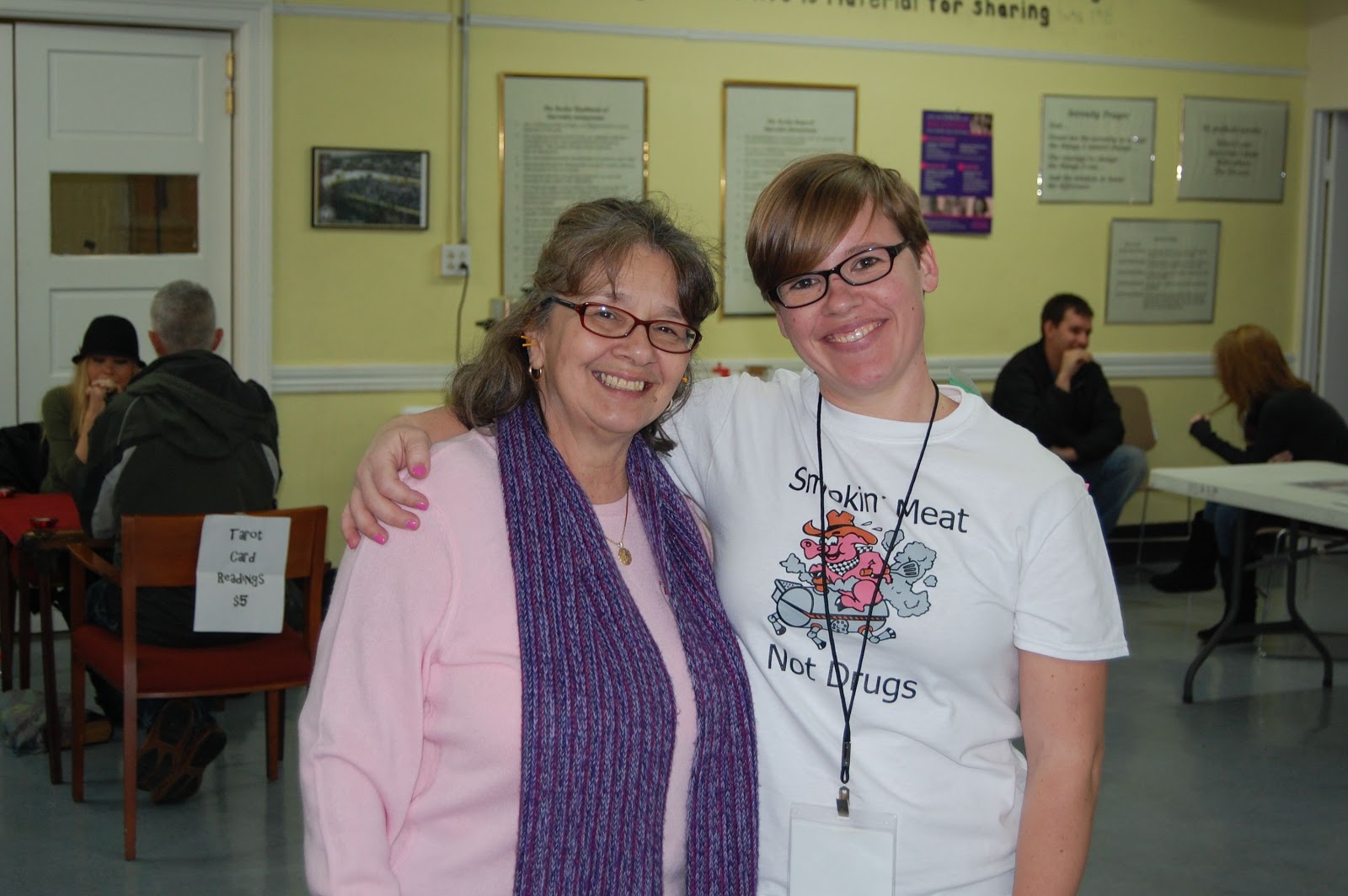Founded in 2004, The McShin Foundation is Virginia's leading non-profit, authentic full service Recovery Community Organization. We are committed to serving individuals and families in their fight against Substance Use Disorders and are changing lives in this process.
Thursday, February 28, 2013
Tuesday, February 26, 2013
Latest On HB1672
Bill Tracking
Nasal Naloxone Bil
01/07/13 House: Prefiled and ordered printed; offered 01/09/13 13103360D
01/07/13 House: Referred to Committee on Health, Welfare and Institutions
01/11/13 House: Assigned HWI sub: #1
01/28/13 House: Subcommittee recommends reporting with amendment(s) (5-Y 0-N)
01/31/13 House: Reported from Health, Welfare and Institutions with substitute (22-Y 0-N)
01/31/13 House: Committee substitute printed 13104628D-H1
02/01/13 House: Read first time
02/04/13 House: Read second time
02/04/13 House: Committee substitute agreed to 13104628D-H1
02/04/13 House: Engrossed by House - committee substitute HB1672H1
02/05/13 House: Read third time and passed House BLOCK VOTE (100-Y 0-N)
02/05/13 House: VOTE: BLOCK VOTE PASSAGE (100-Y 0-N)
02/06/13 Senate: Constitutional reading dispensed
02/06/13 Senate: Referred to Committee on Education and Health
02/14/13 Senate: Reported from Education and Health (15-Y 0-N)
02/15/13 Senate: Constitutional reading dispensed (40-Y 0-N)
01/07/13 House: Prefiled and ordered printed; offered 01/09/13 13103360D
01/07/13 House: Referred to Committee on Health, Welfare and Institutions
01/11/13 House: Assigned HWI sub: #1
01/28/13 House: Subcommittee recommends reporting with amendment(s) (5-Y 0-N)
01/31/13 House: Reported from Health, Welfare and Institutions with substitute (22-Y 0-N)
01/31/13 House: Committee substitute printed 13104628D-H1
02/01/13 House: Read first time
02/04/13 House: Read second time
02/04/13 House: Committee substitute agreed to 13104628D-H1
02/04/13 House: Engrossed by House - committee substitute HB1672H1
02/05/13 House: Read third time and passed House BLOCK VOTE (100-Y 0-N)
02/05/13 House: VOTE: BLOCK VOTE PASSAGE (100-Y 0-N)
02/06/13 Senate: Constitutional reading dispensed
02/06/13 Senate: Referred to Committee on Education and Health
02/14/13 Senate: Reported from Education and Health (15-Y 0-N)
02/15/13 Senate: Constitutional reading dispensed (40-Y 0-N)
Friday, February 22, 2013
Latest on Medicaid Expansion ... From the Governor's Twitter Page :o(
I firmly oppose any expansion of Medicaid absent sweeping reforms of the program at both the state and federal levels governor.virginia.gov/News/viewRelea…
— Bob McDonnell (@BobMcDonnell) February 20, 2013
Upcoming Spring and Summer Events
Upcoming Events:
April 8th, 2013: 9th Annual Spring Awards Banquet honoring Dr. Sarah Scarbrough and Key Note Speaker, Terry McAuliffe.
April 8th, 2013: 9th Annual Spring Awards Banquet honoring Dr. Sarah Scarbrough and Key Note Speaker, Terry McAuliffe.
· May 10th, 2013 – Annual Golf Classic located at Hanover Country Club
· June 29th, 2013 – 3rd Annual Alumni Picnic
· July 27th, 2013 – 9th Annual Pool Party located at John and Kathy Rueger’s Home
· September 7th, 2013 – 9th Annual Recovery Fest and 4th Annual KCBS BBQ Cook Off
Thursday, February 21, 2013
DSM-V: Major Changes to Disease Classification of Addiction
This is not good news. This article is from
Recoverytoday.net
DSM-V - Major Changes to Addictive Disease Classifications
by Bob Curley
Recoverytoday.net
DSM-V - Major Changes to Addictive Disease Classifications
by Bob Curley
The first draft of the American Psychiatric Association’s (APA) latest Diagnostic and Statistical Manual of Mental Disorders (DSM-V) eliminates the disease categories for substance abuse and dependence and replaces it with a new “addictions and related disorders” -- just one of several major changes to the “Bible” used almost universally to diagnose (and get insurance reimbursement for) behavioral-health problems.
“Eliminating the category of dependence will better differentiate between the compulsive drug-seeking behavior of addiction and normal responses of tolerance and withdrawal that some patients experience when using prescribed medications that affect the central nervous system,” the APA explained in a Feb. 10 press release.
“The term dependence is misleading, because people confuse it with addiction, when in fact the tolerance and withdrawal patients experience are very normal responses to prescribed medications that affect the central nervous system,” said Charles O’Brien, M.D., Ph.D., chair of the APA’s DSM Substance-Related Disorders Work Group. “On the other hand, addiction is compulsive drug- seeking behavior which is quite different. We hope that this new classification will help end this wide-spread misunderstanding.”
The new category for addictive diseases would include a variety of “substance-use disorders” broken down by drug type, such as “cannabis-use disorder” and “alcohol-use disorder.” Diagnostic criteria for these disorders in DSM-V would remain “very similar” to those found in the current DSM-IV, according to APA. However, the symptom of “drug craving” would be added to the criteria, while a symptom that referred to “problems with law enforcement” would be eliminated “because of cultural considerations that make the criteria difficult to apply internationally,” APA said.
Also new to the DSM-V are diagnostic criteria for “cannabis withdrawal,” which the APA says is caused by “cessation of cannabis use that has been heavy and prolonged,” results in “clinically significant distress or impairment in social, occupational, or other important areas of functioning,” and is characterized by at least three of these symptoms: irritability, anger or aggression; nervousness or anxiety; sleep difficulties (insomnia); decreased appetite or weight loss; restlessness; depressed mood; and or physical symptoms such as stomach pain, shakiness or tremors, sweating, fever, chills, and headache.
Battle Over ‘Addiction’ and ‘Dependence’
The APA has gone back and forth between use of the terms “addiction” and “dependence” to describe alcohol and other drug problems, noted researcher Stanton Peele, Ph.D. “Every book I’ve written has the word “addiction” in the title, so I’m glad the term will now be recognized,” wrote Peele in the Huffington Post on Feb. 11. “But the change back may make us wonder whether we will have to reconsider every twenty years or so whether it is more beneficial or harmful to use a word loaded with cultural meanings (“addiction”), or a more neutral term (“dependence”).”
In fact, “dependence” made it into the DSM-IV by just a single vote, O’Brien noted in a May 2006 editorial in the American Journal of Psychiatry co-authored by Nora Volkow, M.D., director of the National Institute on Drug Abuse, and T-K Li, M.D., then-head of the National Institute on Alcohol Abuse and Alcoholism.
“Experience over the past two decades has demonstrated that this decision was a serious mistake,” the trio wrote. “The term ‘dependence’ has traditionally been used to describe ‘physical dependence,’ which refers to the adaptations that result in withdrawal symptoms when drugs, such as alcohol and heroin, are discontinued. Physical dependence is also observed with certain psychoactive medications, such as antidepressants and beta-blockers. However, the adaptations associated with drug withdrawal are distinct from the adaptations that result in addiction, which refers to the loss of control over the intense urges to take the drug even at the expense of adverse consequences.”
Gambling Addiction Makes the Cut
The proposed DSM-V also would add a new category of “behavioral addictions” which contains a single disorder: gambling addiction. “Internet addiction was considered for this category, but work group members decided there was insufficient research data to do so, so they recommended it be included in the manual’s appendix instead, with a goal of encouraging additional study,” according to an APA press release.
The net effect is that the term “addiction” would now be officially applied to more than alcohol and other drug related disorders. “There is substantive research that supports the position that pathological gambling and substance-use disorders are very similar in the way they affect the brain and neurological reward system,” said O’Brien. “Both are related to poor impulse control and the brain’s system of reward and aggression.”
Peele argues that the APA’s addictions category could be expanded even further to include “life-harming, compulsive” involvement with things like sex and food, which are classified in the DSM-V draft as separate “hypersexuality” and “binge eating” disorders. The APA also is looking to create a classification for patients who suffer withdrawal symptoms when they stop taking tricyclic and selective serotonin reuptake inhibitors, two types of antidepression medication. These “miscellaneous discontinuation syndromes” fall outside the definition of substance-use disorders, APA said, but share some common traits with use of addictive drugs. “If the substance is abruptly discontinued, in some cases the body responds with a rebound effect that creates unpleasant, and sometimes serious, symptoms of withdrawal,” said O’Brien.
Wednesday, February 20, 2013
McShin's 9th Annual Spring Awards Banquet
McShin's 9th Annual Spring Awards Banquet
Monday, April 8, 2013
6:00pm until 8:30pm
Terry McAuliffe, Governor hopeful, will be our key note speaker. We will be honoring Dr. Sarah Scarbrough with the National Council on Alcoholism and Drug Dependence Bronze Key Award. She is honored for her dissertation on reducing recidivism in returning offenders with alcohol and drug related offenses: contracts for the delivery of authentic peer based Recovery Support Services in the Kingdom Life Ministries program in the Richmond City Jail. There will be food and a beautiful venue to enjoy!
Monday, April 8, 2013
6:00pm until 8:30pm
Terry McAuliffe, Governor hopeful, will be our key note speaker. We will be honoring Dr. Sarah Scarbrough with the National Council on Alcoholism and Drug Dependence Bronze Key Award. She is honored for her dissertation on reducing recidivism in returning offenders with alcohol and drug related offenses: contracts for the delivery of authentic peer based Recovery Support Services in the Kingdom Life Ministries program in the Richmond City Jail. There will be food and a beautiful venue to enjoy!
Tuesday, February 19, 2013
The Anonymous People
The Anonymous People - Successful KickStarter Video from Greg Williams on Vimeo.
...Coming Soon to Richmond or a town near you!
Also interesting to know, you will notice that part of this movie was filmed at McShin Foundation, featuring President John Shinholser and clients.
The Anonymous People is an independent film seeking charitable contributions to complete post-production by April of 2013. Please read more about the project and considering a tax-deductible donation at this website:
fracturedatlas.org/site/fiscal/profile?id=7205
fracturedatlas.org/site/fiscal/profile?id=7205
All contributions will go directly toward licensing archival media content, original score, graphics, and other related finishing expenses.
FOLLOW THE PROJECT ON THE OFFICIAL MOVIE TWITTER ACCOUNT: @TheAnonymousPpl
FOLLOW THE PROJECT ON THE OFFICIAL MOVIE FACEBOOK ACCOUNT: facebook.com/TheAnonymousPeopleMovie
Monday, February 18, 2013
E-Newsletter
Did you know McShin has an awesome e-newsletter written by our very own Honesty Liller, Executive Peer Coordinator? How can you get on our mailing list? Simple! Just click on the link below!
Sign up for our Newsletter!
Sign up for our Newsletter!
Friday, February 15, 2013
Subscribe to:
Comments (Atom)

































































































